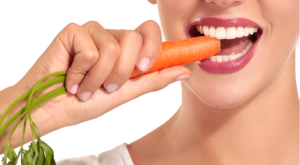
In order to maintain dental health, it is important not only to take good care of them. Many problems can be avoided if you stick to proper nutrition.
After all, with beautiful teeth, your smile will become even brighter. And to have even more reasons to smile in your life.
In this article you will learn how to eat properly so that your teeth are always healthy.
Rule 1: Less Sweet, Flour, Sour and Carbonated Drinks
Sweet and flour are sources of fast carbohydrates. They feed on harmful bacteria that live in our mouths. And while they eat, they secrete lactic acid, which leaches minerals from the tooth enamel. This process is called demineralization. With prolonged exposure to acid, a small depression is formed in the enamel first, then a hole (a carious cavity) appears.
Acidic foods also destroy the surface of the teeth, leading to the appearance of erosions (depressions and dents). This facilitates further work by microbes and accelerates the development of caries.
Carbonated drinks are dangerous because they contain an increased amount of various acids and carbohydrates. For example, almost 2 tablespoons of sugar are dissolved in one glass of cola.
Rule 2: Meals Should Be Regular
It is optimal to eat 3-4 times a day. A more rare diet leads to the fact that the production of saliva in the mouth decreases — and it is necessary to maintain the health of teeth and gums. Saliva saturates the tooth enamel with minerals, thereby strengthening it. In addition, it prevents the formation of sticky plaque on the teeth and neutralizes acids (a product of bacterial activity).
Eating more than 4 times a day is also harmful, because after each meal, microbes are activated and the level of acidity in the mouth increases. But due to small breaks, the buffering effect of saliva decreases — in other words, it does not have time to cope with the load. Teeth and gums may begin to deteriorate.
Rule 3: Food Should Be Moderately Tough
Your diet should contain more raw or slightly processed vegetables, fruits, grain dishes, nuts. In this regard, Chinese cuisine is good, where the products are only slightly allowed, and not stewed to a homogeneous mass.
Such moderately tough food has two advantages. Firstly, it helps to mechanically clean teeth, reducing plaque formation. Secondly, it makes the periodontal tissues (those that surround the root of the tooth) “work”. Due to increased blood flow, they receive more nutrients — which means that the gums remain strong and healthy longer, and the teeth are firmly held in place.
Rule 4: Love Cheese
Dentists recommend eating a piece of cheese for dessert — only without bread, crackers and tea. This is an excellent remineralizing product. Due to its viscous consistency, it envelops the teeth and saturates the enamel with calcium and phosphorus. Other dairy products do not have such a prolonged effect. In addition, cheese additionally stimulates the production of saliva and reduces the adhesion of bacteria to the teeth.
Cheese, of course, will not replace brushing teeth, but it can be an excellent help in the fight against caries. Especially if you replace dessert sweets with them.
Rule 5: Drink More Plain Water
Water, like saliva, washes away the remnants of food from the teeth and helps to maintain cleanliness in the oral cavity.
Also, water serves as the main source of fluorides necessary for the prevention of caries. Embedded in the enamel of teeth, fluorides make it stronger and resistant to aggressive acids. In addition, they directly suppress the activity of harmful bacteria.
Take Care of Your Teeth
- Brush your teeth with a brush and fluoride paste 2 times a day. In the morning — 30 minutes before or after breakfast, and in the evening — before going to bed. It is better to use a soft toothbrush, but if you have absolutely healthy gums, it is permissible to use a brush of medium hardness. Recommended brushing time: 2 minutes.
- Clean the interdental spaces at least once a day with dental floss or brushes. This will reduce the risk of developing contact caries — its most common variety, which affects the lateral surfaces of the teeth. For gum diseases, the European Federation of Periodontists recommends giving preference to brushes. Threads (floss) are allowed to be used only on healthy areas of the gum. It is better to select the appropriate thickness of brushes and floss together with a hygienist.
- After each meal, rinse your mouth with plain water or a weak soda solution. If this is not possible, chew gum without sugar. It stimulates the production of saliva, which washes away the remnants of dental food and prevents the work of carious bacteria. Leading dental associations recommend chewing gum for 20 minutes.
- If food gets stuck between your teeth, use a floss, not a toothpick. Toothpicks injure the gums.
- Purchase an irrigator if you have any artificial structures in your mouth (bridges, crowns, implants). With the help of water pressure, it removes a soft plaque from under the gum, which does not fit tightly enough to the artificial teeth, and thereby prevents the development of periodontitis. It is recommended to use an irrigator in the morning and evening after each brushing of teeth.


